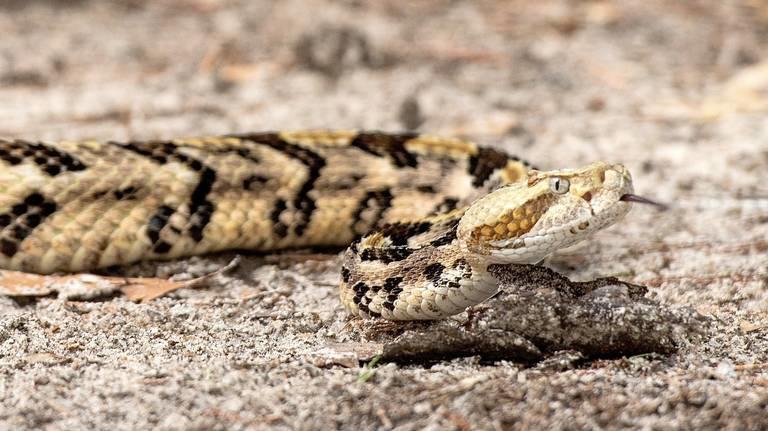
Section Branding
Header Content
Of Georgia’s 46 types of snakes, 3 can be deadly. Here’s what to do and not to do if bitten
Primary Content

They slither. They strike. And sometimes they pack a mean bite.
In Georgia, there are more than 46 species of snakes, according to the Georgia Department of Natural Resources (DNR).
Out of those 46 species, only six are venomous and three represent a fatal threat: the cottonmouth, diamondback rattlesnake and timber rattlesnake.
But of course, if you are bitten by any snake, it can be a frightening time.
The Center for Disease Control and Prevention (CDC) estimates around 7,000 to 8,000 people are bitten by a snake each year in the United States.
And around five people die every year from a snake bite.
If you are bitten by a snake in Georgia, here’s what you should do:
- Stay calm and call 911 or the Georgia Poison Center at 1-800-222-1222.
- Try to identify the snake by looking at its colors, pattern and head shape.
How to treat the bite:
Johns Hopkins Medicine says to do the following while you are waiting for emergency help to arrive:
- Wash the bite with soap and water.
- Keep the bitten area still and lower than the heart.
- Cover the area with a clean, cool compress or a moist dressing to ease swelling and discomfort.
- Monitor breathing and heart rate.
- Remove all rings, watches, and constrictive clothing, in case of swelling.
- Note the time of the bite so that it can be reported to an emergency room healthcare provider if needed.
- If possible, try to remember to draw a circle around the affected area and mark the time of the bite and the initial reaction. If you are able, redraw the circle around the site of injury marking the progression of time.
After help has arrived, you will be given antibiotics, pain medicine and antivenin (antivenom) if needed.
Here’s what not to do
According to the CDC, here’s a list of things you should not do after being bitten by a snake:
- Don’t try to approach or kill the snake. It could strike again and bite a second time.
- Do not wait for symptoms to appear.
- Do not apply a tourniquet.
- Do not slash the wound with a knife or cut it in any way.
- Do not try to suck out the venom.
- Do not apply ice or immerse the wound in water.
- Do not drink alcohol as a painkiller.
- Do not take pain relievers (such as aspirin, ibuprofen, naproxen).
This story comes to GPB through a reporting partnership with The Telegraph.

